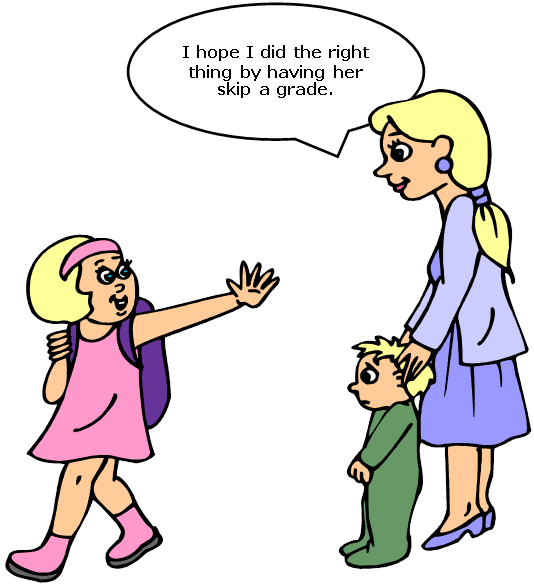KEYS TO PARENTING
YOUR GIFTED CHILD1
You think your child is gifted, but you're not really sure. Research indicates that parents' perceptions of their preschool children's giftedness are usually accurate; however, you may not have confidence in your perceptions.
You've observed your friends' children: sometimes they seem as capable as your child, yet at other times those comparisons make your son or daughter seem unusually intelligent. Of course, you really prefer not making comparisons, but they happen anyway.
SHOULD YOU TEST YOUR PRESCHOOL CHILD?
 Age four is usually early enough for a first testing if you require the information for school decision-making Tests can supply you with important information about your child's intellectual giftedness, as long as you recognize that test results tend to be somewhat unreliable for preschool children. Scores can easily be lowered by shyness, a bad day, or merely fear of a particular tester. Lucky guesses can enhance the score a little, but slightly higher scores cause fewer problems than dramatically lowered scores.
Age four is usually early enough for a first testing if you require the information for school decision-making Tests can supply you with important information about your child's intellectual giftedness, as long as you recognize that test results tend to be somewhat unreliable for preschool children. Scores can easily be lowered by shyness, a bad day, or merely fear of a particular tester. Lucky guesses can enhance the score a little, but slightly higher scores cause fewer problems than dramatically lowered scores.
Here are several very good reasons for having your preschool child tested:
1. Children who are intellectually gifted may benefit from early entrance to kindergarten, special curriculum planning within kindergarten, or a uniquely enriched preschool environment.
2. Test scores give quantitative data, which you may or may not choose to share with the school when communicating about your child's special needs. These quantitative data are usually based on norms that come from large samples, which permit you to compare your child's development to that of average children of similar age.
3. Weak areas may be discovered that otherwise might be masked by your child's intellectual giftedness. It is not unusual to find verbally gifted children who score poorly in tests of spatial abilities or small motor skills Preschool testing permits you to assist your child in practicing these skills.
4. Test scores will give you confidence in your personal observations or correct them appropriately. For example, some children are very verbal but do not have abstract thinking skills yet and may appear to be gifted. Tests can prevent you from putting too much pressure on your child.
5. Early test scores provide baseline information that will help you to monitor your child's intellectual growth and progress.
If you've decided there may be a reason to test your child, you'll want to find a tester. If you're determining whether your child should be entered into school early or if you believe your child may require special programming, you could request that your local school psychologist do the testing or find a private psychologist or university psychological center familiar with testing gifted children. There's reason to emphasize that the psychologist be familiar with the specialty of gifted children—not all psychologists are. Don't hesitate to ask. The director of gifted education in your state's department of education or your state association for gifted children may be able to help you to find an appropriate tester. State associations are listed on the website of the National Association for Gifted Children (www.nagc.org).
If you sense that your child is gifted but there are no early entrance decisions or specific curriculum changes that need to be considered, you could postpone testing until first grade. Many gifted children learn to read or do math only at the typical age in first grade, and for those children, individual psychoeducational testing can wait until school age.
SCHOOL IDENTIFICATION OF GIFTEDNESS
Public Law 100-297 (1988) provided schools with the most current national definition of giftedness. A similar definition was recommended in the 1993 federal report, National Excellence: A Case for Developing America's Talent (Public Law 100-297, Sec. 4103. Definitions):
The term "gifted and talented students" means children and youth who give evidence of high performance capability in areas such as intellectual, creative, artistic, or leadership capacity, or in specific academic fields, and who require services or activities not ordinarily provided by the school in order to fully develop such capabilities.
Even if your children are gifted, your children's school may not be providing for their types of giftedness. Schools and states differ in their approaches to identifying children for gifted programming, and many do not even provide special programs. Furthermore, some schools may have programs that only provide for certain kinds of giftedness; for example, they may only provide for high achievers and neglect those children who possess leadership, creative, and artistic abilities.
 For many years, economically disadvantaged students and minority groups were greatly underserved. More recently, efforts to appropriately identify and program for these populations have increased dramatically.
For many years, economically disadvantaged students and minority groups were greatly underserved. More recently, efforts to appropriately identify and program for these populations have increased dramatically.
Some school districts use only group IQ scores for identification of their students. Other schools may include creativity tests, student products (such as artwork or music), peer or parent nominations, and/or teacher recommendations. The identification process may seem quite confusing to parents. However, parents shouldn't hesitate to ask questions of school personnel. Schools will undoubtedly be happy to communicate their philosophies and selection criteria.
PROGRAMMING FROM GIFTED CHILDREN
If you become aware of an actual lack of academic challenge for your gifted child, you'll want to explore ways to obtain a more stimulating and challenging curriculum. This lack of challenge may be brought to your attention by your child or your child's teacher. Gifted resource programs, classroom enrichment and differentiation, and subject acceleration provide appropriate curriculum adjustments for most gifted children. Grade skipping is usually the preferred arrangement for students who have very high IQs and strong overall achievement.
"Grade skipping is usually the preferred arrangement for students who have very high IQs and strong overall achievement"
Parents and teachers often are reluctant to recommend grade skipping from concern that it places too much pressure on the children and that the skipping will negatively affect their social adjustment. Adults may want to remind themselves, however, that doing nothing is also making a decision. If adults don't make accommodations to challenge their gifted children or students, this gives these children a message that academic challenge is a lesser priority than social conformity and that hard work is unimportant. This message of conformity may cause problems when children become adolescents. Teenagers may repeat the message in another form and tell their parents and teachers that social life is their main priority and that they don't want to work hard on their schoolwork.
Adults may want to remind themselves, however, that doing nothing is also making a decision. If adults don't make accommodations to challenge their gifted children or students, this gives these children a message that academic challenge is a lesser priority than social conformity and that hard work is unimportant. This message of conformity may cause problems when children become adolescents. Teenagers may repeat the message in another form and tell their parents and teachers that social life is their main priority and that they don't want to work hard on their schoolwork.
Individual tests of academic ability (IQ) and achievement are the most important evaluative measures used for acceleration decision-making Despite the many documented problems of IQ tests, they provide good predictors for successful grade skipping.
The availability and quality of school enrichment programs and the academic makeup of the child's present class, as well as that of the class to which the child would be advanced, should also be considered. Peer academic environments can vary from grade to grade, and sometimes a challenging peer group in the lower grade can provide more appropriate learning than a less challenging peer group in the higher grade.
Other variables that should be considered are motivation, or lack thereof, social adjustment, physical size and maturity, grades, and attitude of the receiving teacher. These are of lesser importance than test scores and academic environment because: (1) grade skipping may improve motivation; (2) all studies indicate that grade skipping has no negative effect on social adjustment, and some research has shown that grade skipping actually helps adjustment; (3) physical size, maturity, and grades don't appear to make a difference in adjustment; and (4) although attitude of the receiving teacher appears to make a dramatic, immediate difference, it does not seem to have any long-term effects.
You may wonder why it is that so many parents, teachers, and administrators oppose grade skipping when controlled research documents its success, both academically and socially. People tend to base their evaluations of the success of grade skipping on their personal experiences with children who were grade skipped Almost everyone can recount a grade-skipping story about an adolescent who has experienced difficult social adjustment problems, and they are quick to assume that the problems were caused by the skipping of one or more grades.
Normal adolescents, however, gifted or otherwise, skipped or not skipped, experience developmentally appropriate problems during adolescence. Sometimes they're not invited to a party where they'd like to be, and they usually must cope with rejection by at least one boyfriend or girlfriend. Unfortunately, when grade-skipped adolescents encounter these typical problems, they, their parents, and their teachers tend to blame the problems on the grade skipping. If they haven't jumped a grade, however, the problems are assumed to be normal. Some research also indicates that profoundly gifted children (those with IQs of over 145) tend to have greater social problems than more typically gifted children; thus the assumption that grade skipping causes social problems is made by adults who are not specialized in the psychology of gifted children.
FAMILY ISSUES FOR GIFTED CHILDREN
Some special parenting issues affect first and only children, especially gifted children, and can enhance their giftedness; other issues can cause serious problems. Some of these issues make parenting easier, but others make it harder.
 First children are only children for at least a little time until siblings are born. Sometimes they are only children for many years. Therefore, they are at risk of being attention addicted and too powerful. With a two-to-one, adult-to-child ratio, they easily become the center of adult attention. If you add several grandparents or aunts and uncles, the attention ratio may be multiplied. It's easy to take one child along to adult social functions at which the child may be the center of an adult audience or included in adult conversations. Parents may treat them as consultants—for example, "Where would you like to eat?" or "What would you like to do tonight?" These children feel equally powerful to their parents, and sometimes, even more powerful. Democracy may begin too early for first and only children. They can't imagine why they require adult guidance when they already feel like one of the adults, and they may not do well sharing attention.
First children are only children for at least a little time until siblings are born. Sometimes they are only children for many years. Therefore, they are at risk of being attention addicted and too powerful. With a two-to-one, adult-to-child ratio, they easily become the center of adult attention. If you add several grandparents or aunts and uncles, the attention ratio may be multiplied. It's easy to take one child along to adult social functions at which the child may be the center of an adult audience or included in adult conversations. Parents may treat them as consultants—for example, "Where would you like to eat?" or "What would you like to do tonight?" These children feel equally powerful to their parents, and sometimes, even more powerful. Democracy may begin too early for first and only children. They can't imagine why they require adult guidance when they already feel like one of the adults, and they may not do well sharing attention.
"Sibling relationships can
also be complicated"
Sibling relationships can also be complicated. Sibling relationships cause concern in all families but having gifted children in the family may complicate sibling matters.
GIFTED CHILDREN WITH LESS
TALENTED SIBLINGS
Gifted children with very high intelligence or extraordinary talents may present impossible competition in their areas of giftedness for other children in their families. These children's unique abilities often require inordinate investments of time and resources to develop their talents and meet their unconventional needs. In the process, gifted children naturally receive large amounts of attention and recognition. Brothers and sisters must be able to admire their gifted siblings' successes but also must recognize that similar levels of success may not be attainable for them. Less talented siblings must use a different measuring stick to evaluate their own abilities, or they may fall into the trap of viewing their own real successes (and themselves) as failures.
One critical underlying principle should always guide you in decision-making each child should be provided with the best possible opportunities for intellectual and creative development. A belief in equal treatment in the name of democracy can easily misguide you to withdraw opportunities for gifted children because other siblings are unable to participate. On the other hand, fair treatment provides all children in the family with affordable and attractive opportunities that fit their special interests and capabilities. Treating siblings the same can actually exacerbate the competition they feel. Within my book you'll find many other topics.
"A belief in equal treatment in the name of democracy can easily misguide you to withdraw opportunities for gifted children"
1Excerpted from Keys to Parenting the Gifted Child (3rd Ed.) by Sylvia Rimm, 2006 (Great Potential Press).
©2006 by Sylvia B. Rimm. All rights reserved. This publication, or parts thereof, may not be reproduced in any form without written permission of the author.
